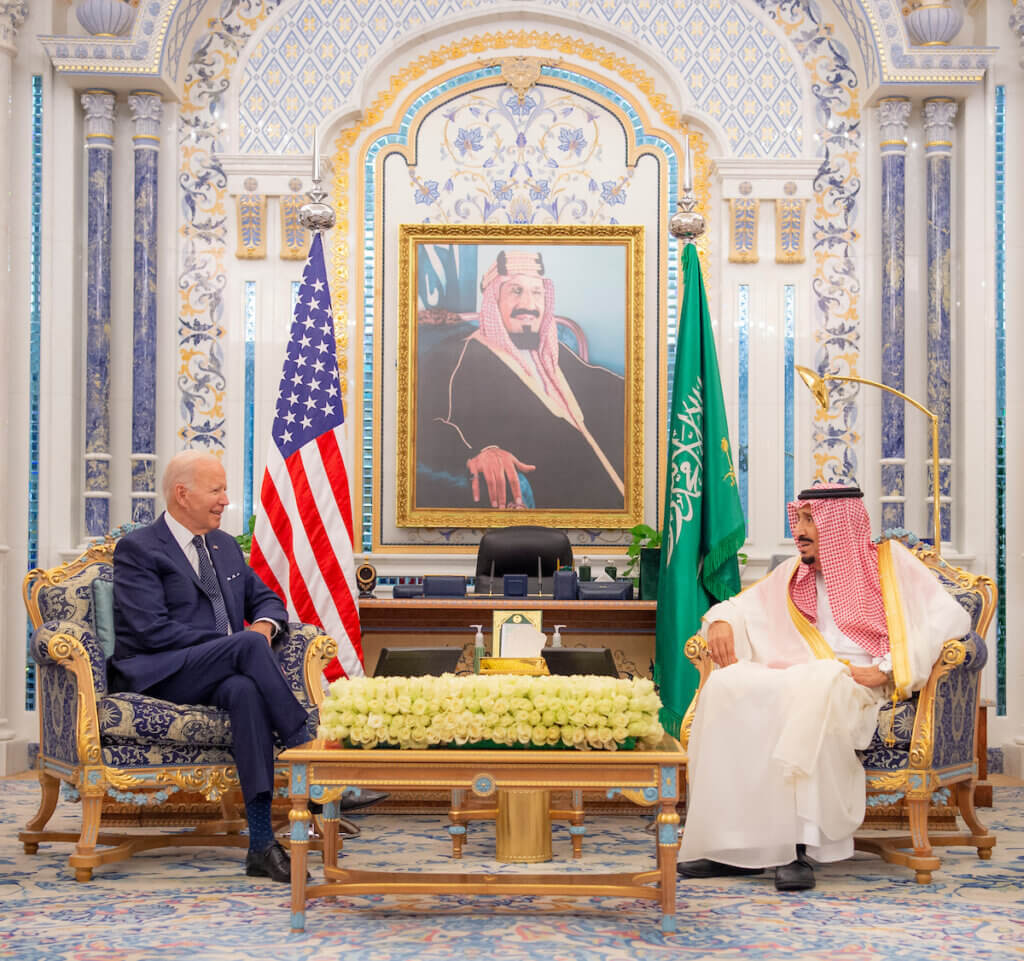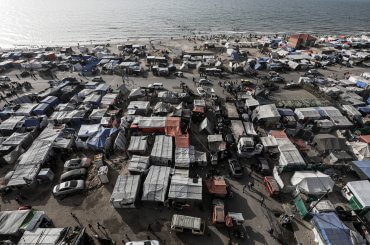As the Biden administration continues its desperate, quixotic push toward a normalization agreement between Saudi Arabia and Israel, discussion among the punditry and the politicians has moved to some of the specific points of the deal. This week, the main topic of conversation has been a potential U.S. agreement to help Saudi Arabia develop a civilian nuclear program.
The prospects of such an agreement remain largely confined to fantasy. The obstacles to a normalization deal are far too great. But the very nature of the discussion reveals a great deal, not only about the relationships between the parties involved but also about the dangerous double standards at play around the entire question of nuclear power in the Middle East.
The most important arena in which that double standard plays out is in tensions with Iran, where all three parties — Israel, Saudi Arabia, and the United States — have raised tensions nearly to the point of war, or even to war by proxy, as in Yemen, over a nuclear issue that may or may not be real. But there are some fundamental issues about nuclear power and weapons development that we should also consider.
The controversy erupted last week when Israel’s Minister of Strategic Affairs and former Ambassador to the United States, Ron Dermer, implied that Israel would accept a Saudi nuclear program, stating that the United States should help develop Saudi Arabia’s program because they might otherwise go to Russia or China for that help. He’s not wrong about that last part, although that is not a great argument for supporting Saudi nuclear ambitions.
In response, Israeli Prime Minister Benjamin Netanyahu did not immediately refute Dermer, saying only that Israel’s policy opposing any nuclear weapons program in the region (except its own, naturally) remained in place. He later said more clearly that Israel would not permit other countries in the region to have their own nuclear programs. Netanyahu blithely ignored the fact that Israel has no right to make such decisions. Nor, for that matter, does the United States.
More quietly, because it was said to an Israeli, rather than an international audience, Netanyahu’s national security adviser, Tzachi Hanegbi, told the KANN news service on July 31 that Israel would accept a Saudi nuclear program, even one that allowed the Saudis to enrich uranium on their own soil — something that has long been seen as a hard red line for Israel. That didn’t make the same headlines, but it was even more significant.
The hubristic language that is widely used by Israeli and American officials and pundits elides one simple fact: under the Nuclear Nonproliferation Treaty (NPT), any country is entitled to pursue a civilian nuclear power program, including enriching uranium on its own soil. The United States, and much less Israel, has no right to dictate who will or will not have nuclear enrichment programs. That right is not compromised just because the United States or Israel have an adversarial relationship with that country, as they do with Iran.
That the U.S. and Israel act as if it were otherwise is particularly disturbing considering the positions of those two countries. The United States remains the only country in the world to have ever used a nuclear weapon. It did so under circumstances that did not demand such a doomsday move, especially in targeting civilians, even if there are still many who defend that decision. Israel, for its part, is the only country in the world to have nuclear weapons, but not to admit it. Yet these two countries believe they are entitled to decide who can or cannot pursue independent nuclear power. The arrogance there is not just offensive, it is provocative.
Iran’s track record
The question of a country being able to enrich uranium independently is central. It is the focus of all of the tensions with Iran over its nuclear program. Even the U.S. and Israel cannot deny that Iran is permitted to have nuclear power plants, just like any other country. They can’t even technically contend that Iran has no right to enrich uranium itself, no matter that they dislike Iran having that right.
Iran’s enrichment program has sparked tensions between the Islamic Republic and its adversaries for decades. It began two decades ago when Iran failed to meet some of its obligations for transparency of its enrichment program. This raised concerns that Iran might be pursuing a clandestine nuclear weapons program that it was hiding from the International Atomic Energy Agency (IAEA). Under the NPT, non-nuclear weapon states that are enriching uranium are required to allow for strict monitoring and to sign an “Additional Protocol” that allows for intrusive inspections to ensure that no weapons program is being undertaken.
This was complicated in the early 2000s, particularly because the United States was discovered to have been spying on Iraq under the guise of an international weapons inspection regime during the Clinton administration. Iran resisted signing the Additional Protocol, and eventually also fell short of its commitments in the NPT. Since it was true that elements of the Iranian government did indeed want to acquire a nuclear weapon, there was some cause for concern at that time.
Twenty years later, though, U.S. National Intelligence Estimates (NIE) have confirmed that Iran hasn’t been seeking a nuclear weapon since 2003. That started with a 2007 NIE assessment and has remained constant ever since, with the latest confirmation coming in June of this year. But Iran can and does enrich uranium itself. They’re far from the only country that does so. Aside from countries with nuclear weapons (the U.S., China, Russia, the U.K., France, India, Pakistan, North Korea, and Israel), Argentina, Brazil, Germany, Japan, and the Netherlands also have independent enrichment programs.
But the whole root of the concern about Iran’s nuclear program, the point that has brought the region close to a cataclysmic war on more than one occasion, is the fact that it is possible for any state that enriches its own uranium to clandestinely build a nuclear weapon, especially if it limits IAEA inspections. But independent enrichment is the key to that ability, and an independent enrichment program is what Saudi Arabia wants.
Saudi Arabia’s ‘malign influence in the region’
Just as it is eminently possible that Iran wants a nuclear program for peaceful purposes (the U.S. is well aware that Iran’s higher levels of enrichment in recent years are simply the only tool it has to respond to the U.S. having abrogated the nuclear deal), it is quite possible that the Saudis want the program for peaceful purposes as well, to diversify their energy production and to do that diversification in a way that is not forever dependent on other countries’ cooperation. It’s not at all an unreasonable desire if that’s all there is. But given the hysterical reactions to Iran from Israel and the U.S., it’s worth looking at the Saudi ambition more closely and asking the same questions that Iran hawks have asked about the Islamic Republic: Does Saudi Arabia see this as a back road to nuclear weapons?
Where Iran has always maintained that they are barred by their faith, and a religious decree from their Supreme Leader, from pursuing nuclear weapons, Saudi Crown Prince Muhammad Bin Salman (MBS) has openly expressed his desire for nuclear weapons. MBS has couched that statement in terms of defending against a potential Iranian nuclear weapon, but he is fully aware that Iran has not been pursuing one, despite the overblown rhetoric that has consistently flowed from Jerusalem and from some parties in Washington as well. Rhetoric which, it bears repeating, contradicts intelligence assessments.
Saudi Arabia is also a much more aggressive country than Iran. For all the ongoing rhetoric about Iran’s “malign influence in the region,” Saudi Arabia is much worse. They are actively involved in conflicts all over the region to a considerably higher degree than Iran. While Iran is hardly on the side of the angels regarding its involvement in Lebanon and Syria, Saudi Arabia has also directly interfered in those countries and throughout the region. Both countries support various armed groups throughout the Middle East. There is no basis for the idea that Saudi Arabia is any more trustworthy with independent enrichment than Iran. There’s actually more reason to be worried about the Saudis.
Indeed, it is telling that Israel seems so unconcerned about a Saudi Arabia with nuclear potential. Clearly, Netanyahu is not thrilled at the prospect, but the fact that people as close to him as Hanegbi and Dermer have floated the idea certainly demonstrates it is far from the apocalyptic prospect for the Israeli government than Iran is. Of course, Israel’s relationship with the two countries is very different. Still, it was only six years ago that Israel was objecting to a Trump administration arms deal with the Saudis. And those were conventional weapons, albeit sophisticated ones.
Saudi Arabia clearly has designs on being a stronger regional power than it already is. It has pursued that goal in a variety of ways, economic, political, and military. Their human rights record is appalling, with the latest scandal being the massacre of hundreds of Ethiopian migrants at its border. U.S. and Israeli leaders love to point at Iran’s brutal treatment of women, but Saudi Arabia is at least as bad. Yet a Saudi nuclear enrichment program seems to be of comparatively small concern. Indeed, the biggest worry—and it’s a considerable one—is that Saudi enrichment will lead other states in the region to demand their own enrichment programs, something countries like the United Arab Emirates, which got a civilian nuclear program with U.S. support, do not have.
‘What Washington wants’
What does that say about the view of Iran’s nuclear program? It says that the hand-wringing is not really about a realistic fear that Iran might develop a nuclear weapon, but rather about undermining Iran strategically. We had a mechanism in place that ensured that Iran could not develop a weapon, a mechanism that even Trump administration officials agreed was working. And that was true even though under both Barack Obama and Donald Trump, Iran saw much less of an economic boon from the deal than was expected.
Yet the U.S. unilaterally, and for no reason, abandoned that deal. This was not a mere fit of madness by Donald Trump. Joe Biden did nothing to restore that deal until long after a much more hardline government was elected in Iran. It is not credible to contend that this was just an oversight. The United States had the means to ensure that Iran could only enrich uranium for peaceful purposes, and when we saw that system working we, at the behest of Israel and its supporters, destroyed that system.
And now, the Biden administration is considering setting up a Saudi nuclear program. Even if at first the U.S. does not give the Saudis the means to start enriching uranium on their own, this could easily change in the future.
From Biden’s point of view, the idea of making sure that Washington, rather than Beijing, helps Saudi Arabia in this regard is a big motivation. Former U.S. officials Aaron David Miller and Dan Kurtzer, both of whom are highly skeptical of the idea of a Saudi nuclear program, wrote that, “A U.S.-brokered Israeli-Saudi normalization accord is clearly designed to address U.S. worries about Chinese influence in the Middle East, with the added benefit of reasserting U.S. leadership in the region.”
It may be designed that way, but it won’t have that effect. Saudi Arabia is not seeking to choose between China and the U.S. but to maximize the benefits it can get from relationship with both. China recognizes this and is content to nurture its relationship with the Saudis and let it grow organically. Biden, by contrast, is following the tired U.S. playbook of throwing ever more lavish gifts at regional allies who still need Washington far more than Washington needs them. It has been a disastrous policy in Israel, and Biden is now making the same mistake with Saudi Arabia.
Ultimately, it is not up to the United States what country does or does not have a peaceful, civilian nuclear program. The NPT guarantees all signatories that right and the U.S., Iran, and Saudi Arabia are all signatories. Israel, tellingly, is not, and it is their enrichment program at the Dimona nuclear facility that should be a priority for all the world.
As long as a potential Saudi nuclear program is tied to a normalization agreement between the kingdom and Israel it will not materialize any time soon. But Saudi Arabia is likely to de-couple those processes at some point. Whatever the U.S. decides to do at that point, it has already demonstrated that its so-called “rules-based order,” — which has precious little connection to international law or any real set of rules outside of “what Washington wants” — is dangerously discriminatory.
Finally, it’s worth noting that while Iran did not always live up to all of its transparency obligations twenty years ago, the U.S. is in a much graver breach of the NPT. Article VI reads, “Each of the Parties to the Treaty undertakes to pursue negotiations in good faith on effective measures relating to cessation of the nuclear arms race at an early date and to nuclear disarmament, and on a treaty on general and complete disarmament under strict and effective international control.” The U.S., as well as Israel, have been in violation of that provision for a very long time.



Today six applications to join BRICS were formally approved – Saudia Arabia, Iran, the UAE, Egypt, Ethiopia, and Argentina. Over twenty countries have applied, and another twenty are considering applying.
It’s looking like the Israeli-US-UK hegemony is crumbling. All these countries around the world are in open rebellion against this hegemony. As was stated plainly at the recent BRICS conference, they no longer need it’s parasitical assistance, nor need fear its military interventions.
It seems that climate change is not important, judging by this piece and by its relative lack of coverage in other Mondoweiss articles. Dangerous, polluting and hugely expensive nuclear energy needs to be phased out as soon as possible. Political arguments over which states should be permitted to build new nuclear facilities are utterly wrong-headed. Renewable energy is the future; nuclear is the filthy past and present.
There is also the undeniable close link between nuclear energy programmes and nuclear weapons development, which is probably the only reason for the start and continuation of states’ nuclear energy programmes anywhere. The gigantic cost overruns of every nuclear power plant are secretly justified by governments on the grounds that such plants supply enriched uranium for weapons – though they rarely admit it.
Iran, Saudi Arabia and any other state wanting to begin a nuclear energy programme must be opposed by us all, as we campaign to end the use of nuclear energy in our own countries.
https://cnduk.org/resources/links-nuclear-power-nuclear-weapons/
Mitch, if you want to identify the reason(s) for U.S. “hyprocisy,” here are a few:
A horde of louts committed an act of war against the United States, invading and occupying its Embassy and kidnapping its diplomats for over a year. Saudi Arabia did not do this.
Mobs in Iran chant “Death to America,” no one is Saudi Arabia does.
Iranian naval as well as irregular vessels often commit acts of piracy in the Persian Gulf, seizing oil tankers and detaining their crews. Saudi Arabia does not.
Iran sells drones to Russia in furtherance of its criminal aggression against Ukraine. Saudi Arabia does not.
Nations are like people. When another country regularly abuses, insults and threatens you, you tend to cop an attitude. It’s ridiculous to expect the U.S. to be altogether neutral and objective between those two countries.